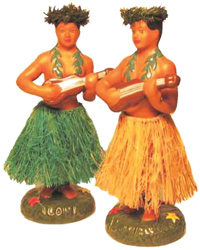 By Herbert A. Sample
By Herbert A. Sample
The Associated Press
HONOLULU (AP) — Hawaii’s tourism industry has long touted the islands’ native culture as a selling point to prospective visitors — such as leis, luaus, and the “aloha spirit.”
But Native Hawaiians appear to have little regard for the tourism industry’s impact on their culture, according to a survey released Feb. 12 by the Hawaii Tourism Authority.
The random telephone poll of 1,650 Hawaii residents, designed to represent the state’s ethnic and geographic demography, found overwhelming appreciation of the benefits the tourism industry brings to Hawaii.
But there was less contentment among Native Hawaiians, who have long complained that the industry contorts their culture and uses it as a moneymaking device.
Almost 60 percent of the 401 Native Hawaiians surveyed disagreed with the statement that the industry “helps to preserve Native Hawaiian language and culture,” the survey found. Fifty-five percent of whites, 44 percent of Japanese, and 36 percent of Filipinos also disagreed with the statement.
“The Hawaiian culture that tourists see is very tourist-oriented,” according to an unidentified Native Hawaiian who was quoted in the study. “Tourists don’t see the authentic culture. They put on leis and sing ‘Tiny Bubbles’” — Don Ho’s famous tune.
The study also found that Native Hawaiians are less aware of the industry’s cultural initiatives, and that the industry has a bad reputation for presenting Hawaiian arts authentically and accurately.
Respondents of all ethnicites also told the surveyers they believe the tourism industry does not help sustain the state’s natural resources.
Peter Apo, a cultural tourism consultant for the industry, said Native Hawaiians over the years have had a negligible relationship with Hawaii’s economic drivers — whether the pineapple plantations of the first half of the 20th century or the visitor industry of the last five decades.
“Tourism raises a higher flashpoint than the other industries (did) simply because it’s built on the backs of Hawaiians and Hawaiian culture,” he said.
Clayton Hee, chairman of the state Senate committee that handles Native Hawaiian issues, said there will always be concerns about the tourism industry because it is centered in areas Native Hawaiians traditionally used to sustain themselves. “I’m old enough to remember my grandfather fishing in Waikiki to sustain his family of 10 children,” said Hee, who is Native Hawaiian.
The Hawaii Tourism Authority will devote at least $600,000 during the current fiscal year on Native Hawaii cultural programs, including the support of music festivals and the restoration of Puukohola Heiau, a cultural site on the Big Island.
The survey’s recommendation is “if we can maybe begin to better highlight what we’re doing and do a better job of that, then that awareness could help with increased satisfaction,” said Momi Akimseu, tourism brand manager for HTA. ♦



